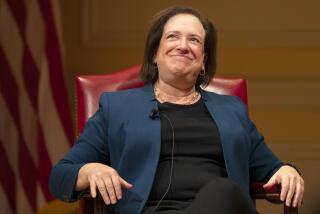Op-Ed: Making oil companies pay for climate change isn’t the right move for science or the Constitution

The federal courts are not meant to provide a remedy for every ill of the world, including climate change. In such matters, we need to rely on the political branches to take charge.
That was the primary message out of the U.S. District Court for the Northern District of California last week, when Judge William Alsup dismissed Oakland’s and San Francisco’s high-profile lawsuits against big oil companies.
The novel lawsuits attracted a great deal of attention in the spring, when Alsup ordered an unusual climate science tutorial for himself in the courtroom. In the end, the decisive issue wasn’t science, however, but whether the federal common law of public nuisance could carry the cities’ claims. He ruled that the cities couldn’t retroactively pin the costs of climate change on BP, Chevron, ConocoPhillips, Exxon Mobile and Royal Dutch Shell for their past lawful behavior (selling oil).
It disappointed environmental activists. But the court was right to focus on the principle that the elected branches of government, not the courts, are the proper channels for addressing climate change. In his well-reasoned opinion, Alsup refused to go along with the cities’ regulation-by-litigation strategy.
Constitutional institutions matter. We should guard them from being corrupted and demeaned.
In a key passage, the court explained, “This order fully accepts the vast scientific consensus” regarding climate change and its harmful impacts, including sea-level rise. “But questions of how to appropriately balance these worldwide negatives against the worldwide positives of the energy itself, and of how to allocate the pluses and minuses among the nations of the world, demand the expertise of our environmental agencies, our diplomats, our Executive, and at least the Senate.”
The heated climate change debate too often devolves into polarized rhetoric, so Alsup’s juxtaposition of these two ideas is important to consider. He is saying climate change is real and should be addressed — and the Constitution and prudence tell us whose job that is.
A belief in the proper institutional roles is not a disbelief in the science, or a denial of the urgency of the problem. Instead, this ruling says that federal common law should not be expanded by judicial decree simply to satiate a desire for blame or for a deep pocket. Asking judges to stay neutral and refrain from policymaking from the bench protects the interests of individuals of every political disposition.
Enter the Fray: First takes on the news of the minute from L.A. Times Opinion »
This lawsuit and others still pending — which should similarly be dismissed — are likely counterproductive too, the court explained. “Nuisance suits in various United States judicial districts regarding conduct worldwide are far less likely to solve the problem and, indeed, could interfere with reaching a worldwide consensus.”
Especially troublesome to the court was this: The plaintiff cities wanted the court to declare as wrong the extraction and production of fossil fuels around the world over decades. But producing and selling oil and gas has always been considered lawful. It also would have been improper to apply U.S. law beyond our borders, which would risk interfering with sensitive political, diplomatic and foreign affairs issues connected to energy and environmental policy.
The U.S. Constitution creates separate lanes of powers. Courts must stay in their lane: deciding actual cases dealing only with things that were known as wrongs at the time of their commission. The rule of law frowns on retroactive liability, and the separation of powers forbids judges from making policy, especially by imposing new regulations on previously lawful activity. The order reflects fidelity to these fundamental tenets of our constitutional structure.
Constitutional institutions matter. We should guard them from being corrupted and demeaned. Alsup’s order is a refreshing example against the erosion of the courts into political debating societies.
Donald J. Kochan is a law professor teaching environmental, natural resources and administrative law at Chapman University.
Follow the Opinion section on Twitter @latimesopinionand Facebook
More to Read
A cure for the common opinion
Get thought-provoking perspectives with our weekly newsletter.
You may occasionally receive promotional content from the Los Angeles Times.










